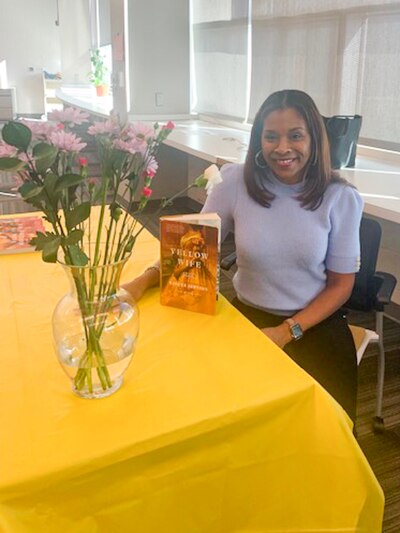It’s not always the most talented person who succeeds, but the most determined, author Sadeqa Johnson told students at her old high school in North Philadelphia.
“I was you,” Johnson — who’s written five books, including two historical novels centering on the Black experience — told a group of about 120 students at George Washington Carver High School of Engineering and Science on Friday.
Many of them had read her 2021 novel “The Yellow Wife,” which drew praise from critics at NPR and the Washington Post, among others. Her latest, “The House of Eve,” is a pick of Reese Witherspoon’s popular book club.
The 1993 Carver graduate said much of her success stems from her experience at the school, a STEM-focused magnet for grades seven through 12. “It was set in my heart that coming from this school I could pretty much do anything,” she said.

“The Yellow Wife” is based on the true story of an enslaved woman in 1850s Virginia who became the wife of a notorious slave jail owner and mother to five of his children. Johnson, who had previously written contemporary fiction when she first heard the story, said she felt called to bring this little-known piece of history to light.
Johnson’s new novel, “The House of Eve,” follows two Black women in 1950s Philadelphia and Washington, D.C., chronicling the struggles they go through as they work to achieve their dreams. She hopes that soon, she’ll be able to call that book a New York Times bestseller.
Johnson said her path to success hasn’t been easy, but told the students she’s glad she never gave up.
“You’re going into a very scary part of life,” she told them. Yet, she said, “the thing that scares you most” may be “what you’re supposed to be doing next.”
Carver senior Mia Downing, chair of the education committee of the school’s Black Student Union, said in an interview before the event that she was looking forward to hearing about how Johnson achieved her success. The student union hosted the event as part of its Black History Month push to “educate people in African-American history,” she said.
A call to tell the story of ancestors
Johnson said she chose to attend Carver after Central High School, another Philadelphia magnet program, rejected her. She said she appreciated going to Carver because there were a lot of “really smart students” at the school who “pushed me to be on top of things.” At Carver, she learned Shakespeare and performed in plays.
After majoring in theater at college, she got a job at a publishing company and began working on a novel. “That novel never saw the light of day,” she told the students. “It was actually pretty terrible.”
So she tried again.
After finishing that second book, Johnson said, she was rejected by 20 literary agents. But she hung the rejection letters on her wall for motivation in the face of constant rejection.
And some of those letters held kernels of encouragement, reminding her that while the book might not be right for a particular editor at that time, her work held promise. The fact that an editor took the time to write her a letter was also encouraging, she said.
Even after finding an agent, Jonson couldn’t find a publisher to take her book after years of working on it.
But she didn’t give up. She and her husband started their own publishing company, while Johnson attended book festivals and pitched her novel to “anyone who would listen to me.”
“It’s not always the person who’s the most talented that is the most successful,” said Johnson, who was also rejected — twice — from graduate school. “It’s the person who won’t give up and won’t take no for an answer. Eventually, the door’s going to open.”
In the end, that novel, “Love in a Carry-on Bag,” was well-received, and three agents wanted her next book, “Second House From the Corner.”
But soon Johnson, living in New Jersey with her husband and three children, began hearing a voice urging her to go somewhere new. She had been writing about the world she knew, but felt a calling to tell a new story, even though the thought of doing something so different made her uncomfortable.
“That was a scary thing, but I’m so glad I said yes to it,” she said. “I found my purpose as a writer is to write historical fiction and shed light on these dark spaces of history.”
After she moved to Richmond, Va., a walk along a trail tracing the history of slavery in the state resulted in a revelation.
A marker on the slave trail noted “the Devil’s half acre,” a slave jail run by Robert Lumpkin, who married a mixed-race woman and fathered five children with her. Johnson, who grew up with an understanding of slavery based on the idea of a plantation and a “scary overseer,” wondered what daily life on that half acre was like for the woman, Mary Lumpkin, and her children.
When she got back into her car after that walk, she said, “It was almost like the ancestors got in the car with me.” That experience led her to write “The Yellow Wife.”
In an interview before Johnson spoke on Friday, Carver history teacher Janel Moore-Almond said she appreciated books like Johnson’s that are grounded in history. Some of the students had read “The Yellow Wife” in an English class two years ago.
And allowing students to “see themselves in an actual author that graduated from the school that they’re in right now” shows the “multiple levels of possibility” available, Moore-Almond said.
Johnson agreed with the Carver teachers’ approach to academics.
“You’re very fortunate,” Johnson told the students. “You have teachers who want to teach this in your curriculum.”





